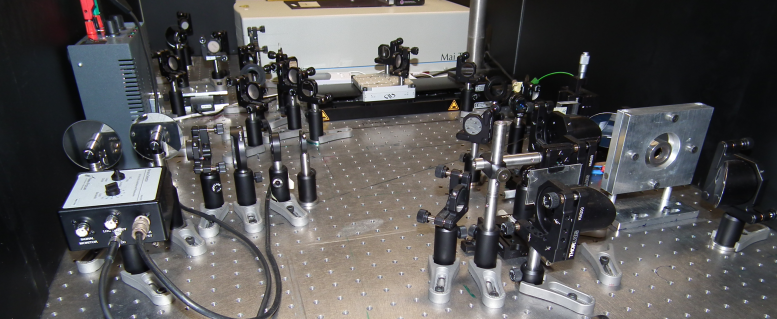Quasi-optics and Millimetre-wave/THz Antennas and Devices
The Antenna Group continues to play an active role as a specialist partner to the likes of the Rutherford Appleton Laboratory (RAL) in quasi-optical circuit design of radiometers and their measurement validation in our anechoic chambers. This capability stems from experience established during the late 1980s and early 1990s UK Met Office programme that participated in the National Oceanic and Atmospheric Administration (NOAA) development of the Advanced Meteorological Sounding Unit B (AMSU-B). More recently the group developed the prototype quasi-optical breadboard under secondment to RAL for the European Space Agency (ESA) Programme to develop MetOp – SG, the second generation of Earth remote monitoring satellites.
To support theoretical work, comprehensive measuremets facilities have been developed in the Antenna Measurement Lab. In particular, THz time-domain spectrometer (THz TDS) and Quasi-optical test bench.
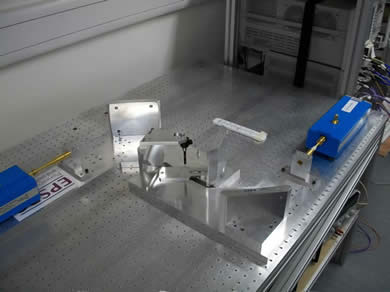
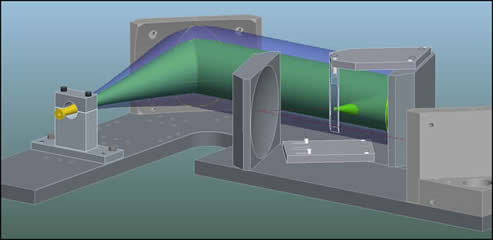
Research activities
Our recent work related to quasi-optics at mm-wave and THz led to the following research activities:
Powerful THz quasi-optical (QO) continuous wave (CW) sources
Rostyslav Dubrovka, Robert Donnan
QO CW THz Sources. It is the recently EPSRC funded project on creating a powerful THz source using an array of non-linear antennas combined with multipliers. One of the major features is a utilisation of light sensitive semi-conductors (in collaboration with SPA) to control frequency selective surfaces and fine tuning of the system instead of conventional dielectrics.
Figures below show manufactured multennas and their placement in the holder for a measuring compaign
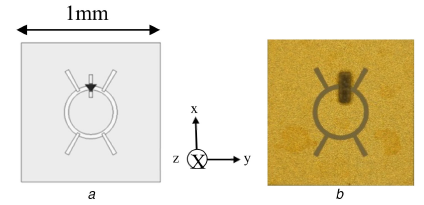
Figure 1: Manufactured multennas on a quartz plate: (a) CAD model; (b) manufactured
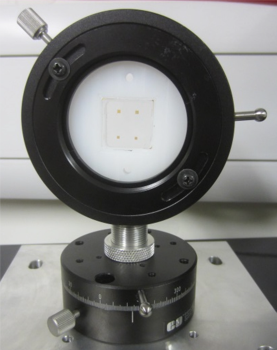
Figure 2: Multennas in the holder
Selected Recent Publications
- Oleksandr Sushko; Melusine Pigeon; Robert S. Donnan; Theo Kreouzis; Clive G. Parini; Rostyslav Dubrovka, “Comparative Study of Sub-THz FSS Filters Fabricated by Inkjet Printing, Microprecision Material Printing, and Photolithography”, IEEE Transactions on Terahertz Science and Technology, vol. 7 (2), pp. 184-190, 2017, DOI: 10.1109/TTHZ.2017.2662582
- Melusine Pigeon; Oleksandr Sushko; Robert S. Donnan; Theo Kreouzis; Clive G. Parini; Hui Wang; Byron Alderman; Peter G. Huggard; Rostyslav Dubrovka, “From simulations to measurements: prototyping an antenna for non-linear applications at sub-THz frequencies”, IET Microwaves, Antennas & Propagation, vol. 11 (3), pp. 304-309, 2017, DOI: 10.1049/iet-map.2016.0392
- O. Sushko; M. Pigeon; T. Kreouzis; C. Parini; R. Donnan; R. Dubrovka, “Low-cost inkjet-printed FSS band-pass filters for 100 and 300 GHz”, 10th European Conference on Antennas and Propagation (EuCAP) 2016, pp. 1 - 3, DOI: 10.1109/EuCAP.2016.7481780
- M. Pigeon; T. Kreouzis; C. Parini; R. Donnan; R. Dubrovka, “Improving Harmonics’ Generation by “zeroing- Stubs” in a Slot-Ring Antenna” ”, 10th European Conference on Antennas and Propagation (EuCAP) 2016
- M. Pigeon; O. Sushko; T. Kreouzis; C. Parini; R. Donnan; R. Dubrovka, “Higher harmonic generation: Coupling two radiating elements at two different frequencies”, LAPC, November 2016, DOI: 10.1109/LAPC.2016.7807618
- O. Sushko; M. Pigeon; T. Kreouzis; C. Parini; R. Donnan; H. Wang; B. Alderman; P. Huggard; R. Dubrovka, “Investigation of frequency-tripling performance of Schottky diode based multennas to 0.3 THz”, IRMMW-THz, September 2016
- M. Pigeon; R. Donnan; T. Kreouzis; C. Parini; R. Dubrovka, “Recent advances in low THz technology”, IET Colloquium on Millimetre-wave and Terahertz Engineering & Technology 2016, March 2016
- A. Andy; J. W. Kneller; R. Dubrovka; T. Kreouzis; R. Donnan ,“Antenna Array Control via Integrated Optically-Activated Organic Semiconductor for S-Band Applications”, EuMW, October 2016
- Andy, A.; Dubrovka, R.; Kreouzis, T.; Donnan, R., “An optically controlled phase shifter for antenna array beam steering”, Antennas and Propagation (EuCAP), 2015 9th European Conference on, Lisbon, 2015
- M. Pigeon, R. Donnan, R. Dubrovka and T. Kreouzis, ”Accelerating Frequency Selective Surface Simulations: An Equivalent Circuit Method versus Computational Electromagnetics Software - Limits and Further Developments”, Antennas and Propagation (EuCAP), 2015 9th European Conference on, Lisbon, 2015
- M. Pigeon, R. Donnan, R. Dubrovka, T. Kreouzis, H. Wang, B. Alderman, P. Huggard, “A Planar Quasi-optic THz Source : The Multenna”, Antennas and Propagation, International Symposium on, 2015
- M. Pigeon, R. Donnan, R. Dubrovka, T. Kreouzis, H. Wang, B. Alderman, P. Huggard, “Towards development of a room-temperature, continuous-wave, high-power THz source”, Photon 2015, London, UK
Design and development of QO passive and active systems for mm and sub-mm wave systems
Robert Donnan, Rostyslav Dubrovka
Our group has been involved as a sub-contractor (other collaborators include such names as RAL, Queen's Belfast, Astrium UK) in the recent ESA activity on design and prototyping of a quasi-optical network for mm-wave sounders, which will be a part of the next generation of meteorological satellites. Activity includes design of many QO elements such as feeds, OMTs, mirrors and a network as a whole
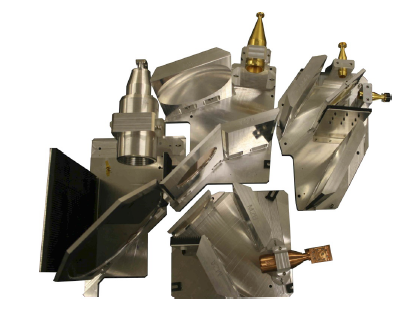
Figure 3: Prototype of the Met-Op quasi-optical network at the Measurement setup
The group also continue research inot mm-wave and THz antennas and devices. One of the topics covered in previous projects was a utilisation of light sensitive organic semiconductors for tuning purposes. Results for tunable lenses and steering phased antenna arrays showed a potential feasibility of devices nased on the light sensitive organic semiconductors.
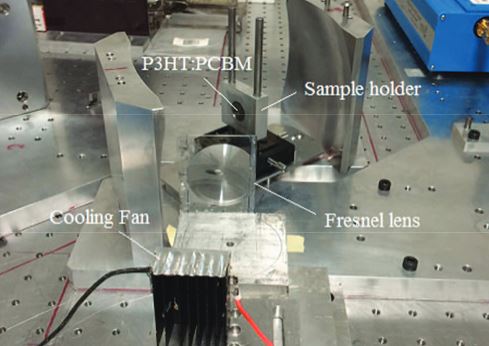
Figure 4: Measurement setup on the quasi-optical measurement-bench to estimate the change in dilectric constant of the organic polymer blend between dark and lit (i.e. active), states.
Selected Recent Publications
- Raymond Dickie;Steven Christie;Robert Cahill;Paul Baine;Vincent Fusco;Kai Parow-Souchon;Manju Henry;Peter G. Huggard;Robert S. Donnan;Oleksandr Sushko;Massimo Candotti;Rostyslav Dubrovka;Clive G. Parini;Ville Kangas, "Low-Pass FSS for 50–230 GHz Quasi-Optical Demultiplexing for the MetOp Second-Generation Microwave Sounder Instrument", IEEE Transactions on Antennas and Propagation, | Volume: 65, Issue: 10, pp. 5312 - 5321, (2017). DOI: 10.1109/TAP.2017.2740978
- Andre S. Andy, James W. E. Kneller, Oleksandr Sushko, Rostyslav Dubrovka, Clive Parini, Ken Scott, Theo Kreouzis, and Robert S. Donnan, "Estimation of dark and active dielectric constants in the sub-THz frequency domain of an optically tunable organic semiconductor blend of poly(3-hexylthiophene) and phenyl-C61-butyric acid methyl ester", Applied Physics Express 11, 061601 (2018), https://doi.org/10.7567/APEX.11.061601
- K. Vytovtov; S. Zouhdi; R. Dubrovka and V. Hnatushenko “The Terahertz Controlled Duplex Isolator. Physical Grounds And Numerical Experiment”, Int. Journal of Microwave Science and technology, Volume 2016 (2016), Article ID 1468508, 7 pages
Propagation and interaction of non-conventional Gaussian Beam modes in THz and optical domain
Rostyslav Dubrovka, Robert Donnan
This research is in its initial stages and makes only first steps but intended to deliver new theoretical knowledge on non-conventional Gaussian modes propagation as well as to investigate a possibilities of abnormal object scattering illuminated by such modes from optical to microwaves domains.
Herein below, there are some results ontained in collaboration with King's College and other universities. An abnormal scattering of radially polarised Gaussian beams, which violates The Optical Theore, has been detected and proven in optival and micorwave frequecmy ranges.
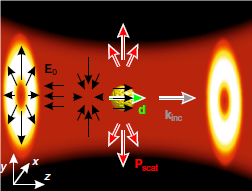
Figure 5: Schematic representation of a nanoparticle illuminated by a radially polarized beam
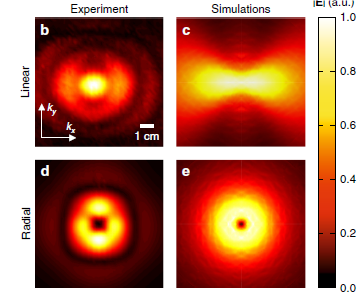
Figure 6: Experiments in the microwave spectral range: Near Fields for linear and radial Gaussian Beams
Selected Recent Publications
- Alexey V. Krasavin, Paulina Segovia, Rostyslav Dubrovka, Nicolas Olivier, Gregory A. Wurtz,
Pavel Ginzburg and Anatoly V. Zayats “Generalization of the optical theorem: experimental proof for radially polarized beams”, Nature. Light: Science & Applications (2018) 7:36, DOI 10.1038/s41377-018-0025-x
THz Circular Dichroism Spectroscopy
Robert Donnan, Rostyslav Dubrovka
Wideband implementation of circular dichroism spectroscopy at mm and submm wavelengths - the versatility of vector network analysis is combined with quasi-optical circuit analysis to enable spectrum sensing of dissolved biomolecules. The biological practice of CD analysis, normally conducted only at one discrete frequency (222 nm), is now available over entire waveguide bands, which are attuned to whole-chain behaviour.
Selected Recent Publications
- Jhih-Hong Cheng , Robert C. Jones, Oleksandr Sushko , Yumiko Tashiro, and Robert Donnanб "Quasi-Optical Sub-THz Circular Dichroism Spectroscopy of Solvated Myoglobin", IEEE Trans. on THz Science and Technology, vol.01, No 4, Jujy 2020, pp. 348-357
- O. Sushko, J. Qiu, R. Dubrovka, R. W. Pickersgill and R. S. Donnan “Sub-terahertz spectroscopy as a probe for protein stability in ionic environment”, IRMMW-THz Conference, 23-28 September 2015, Hong Kong, China.
Highlights and Research Outcomes
In May 2016 we organised and hosted the EPSRC-funded one-day Workshop on "THz Sources for Security, Non-Destructive Testing, Communication and Earth Observation Applications". Presentations from the event are now available.
Selected Research Grants and Projects
- Feb 2014 - Aug 2017 EPSRC EP/K038125/1 Active Quasi-Optics for High Power THz Science £465,158
- EPSRC Research Grant, GR/R16945/01(P), Starts: 03/05/01, Ends: 02/05/2004, Value: £66,950

